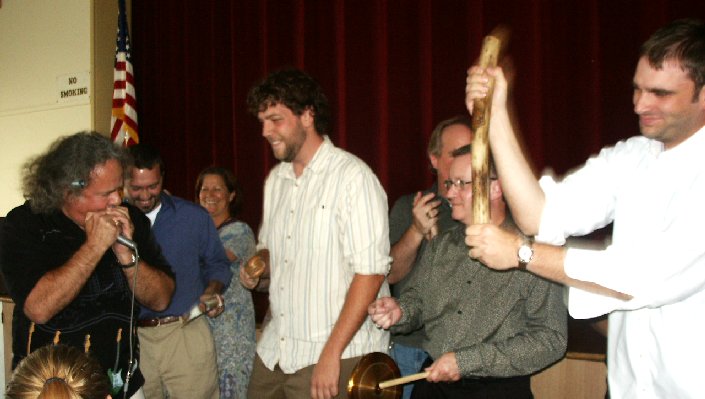|
|
 Jesse Forsland ascotdr@yahoo.com |
 Josh Bream breamj@mdusd.org |
|
|
 Jesse Forsland ascotdr@yahoo.com |
 Josh Bream breamj@mdusd.org |

Olympic High School -
Serving Students Since 1965
Government & Economics
Texts: Magruder’s American
Gov’t.
Economics: Principles in Action - 2006 editions
Credit Policy & Course Description
![]()
Students in grade twelve pursue a deeper
understanding of the institutions of American government. They compare systems
of government in the world today and analyze the history and changing
interpretations of the Constitution, the Bill of Rights, and the current state
of the legislative, executive, and judiciary branches of government. The
standards used for both Economics and Government represent a culmination of
civic literacy as students prepare to vote, participate in community activities,
and assume responsibilities of citizenship.
In Economics will attempt to master fundamental economic concepts, applying the
tools (graphs, statistics, equations) from other subject areas to the
understanding of operations and institutions of economic systems. The course is
studied in a historic context examining the basic economic principles of
micro-and macroeconomics, international economics, comparative economic systems,
measurement, and methods.
Productive period credit is awarded according to the school-wide accepted plan.
A productive period is defined as one in which the student is on time,
participates appropriately in the days activity, and is working on the assigned
task. In order to receive the productive period the student is expected to
produce a body of work that is reasonable for his/her ability and effort.
Additional credit will be given for the work that is satisfactorily completed.
All in-class as well as outside-of-class work has an agreed upon advance value.
In order to do individual out-of-class assignments the student must have at
least 80% productive attendance the preceding week. Service Learning students
are assumed to have at least 80% attendance at their assigned site, and attend
Olympic High School on their required attendance day. A fast track can be
accomplished by a 90% completion of a challenge test arranged with the
instructor.
A partial listing of the individual work available is listed below. The work is
done during the academic week and is structured in the following manner:
Monday- Lecture/activity period
Tuesday- work period and individual attention
Wednesday- film activity
Thursday- work period/ examination
Friday- Processing and application
Each course includes an array of learning materials and strategies. A breakdown
of various expected performances and their credit value follows:
• 16 successful productive periods – one credit
• completion of assignments in text – one credit
• complete and organized folder including all lecture notes and chronologically
ordered activities and lessons – ½ credit
• satisfactory completion of post test - .125 credit
• film write-ups/questions- 16 x 1 = one credit
After three credits have been earned you may elect to complete one of the many
critical thinking and/or participation assignments for up to one credit. A grade
for credit will also include materials contained in three ring binder
The final credit will be issued upon the completion of the post test.
The greatest level of learning will occur when the student participates in the
many activities and is on time, attentive, and by all means productive.
![]()

Modern
World History - Mr. Bream
World History is a required ten-unit
course for high school students that explores 17th century through today. So why
is it important to understand our World History? In a shrinking world,
understanding and awareness are keystones of our way of life. Without knowing
the richness of the nations of this planet we cannot be bound together with a
common purpose and destiny. History is not a cruel punishment dreamed up by the
standards police to frustrate and bore you. It is not a huge textbook which acts
as a muscle developer and/or sleep inducer. And World History is not the study
of unrelated names and dates that you must cram into your head for the dreaded
“exam”. In this class we will get to the roots of why and how we are here today
through a multitude of ways.
Attendance:
Students are expected to attend class and be productive at least 80% of the
time; students who are able to meet this requirement often complete the course
in less than a year. Students that do not attend class regularly and on time and
do not complete their activities in a timely manner will earn credit at a slower
pace than at a comprehensive high school. Students that attend class regularly
and complete their activities in a timely manner will earn credits faster than
at a comprehensive high school. Students enrolled in Service Learning will only
earn productive periods only on days when they are in class, but may work on and
receive credit on their assignments outside of class.
Credit Structure:
• Attendance and productivity: For every day that you are here on time and
productive, you will receive 1/32 of a credit. In other words, for every 16 days
that you are on time and productive, you will receive a ½ credit. Over the
course of a semester, you can earn around three (3) credits just for attendance
and productivity. For every three (3) days you are tardy up to five (5) minutes,
you will lose one (1) productive period. For every day that you are later than
five (5) minutes for class, you will not receive a productive period for that
day.
• Daily Activities: Each daily activity will be worth 1/32 of a credit, and will
be combined with your attendance/productivity. For any days that have activities
that take more than one day to complete, such as movie-length videos, you will
receive activity credit for all the days the activity took to complete.
• Essays: Essays will be worth one (1) credit and will be have three (3) or four
(4) throughout the year. I will accept the essays only after you complete them
and you cannot receive partial credit. Either you complete them or you don’t.
Daily Schedule:
Typical class periods in World History will include group work, current
events, articles, reading, videos, or other activities that will help you apply
what you are learning in class to the real world. We will relate these concepts
to young adults and school culture whenever possible.
My Five (5):
Respect: Respect for yourself, your peers, and your teachers. Many different
opinions will be expressed in this classroom and you must respect the other
people that are expressing it, even if you disagree with it.
Responsibility: It is your responsibility to do your work to the best of your
ability. If you are having trouble and need assistance, we are here for you,
but, you must let us know.
Come on time: Just like in the real world, punctuality matters. Come to my class
on time please and don’t loose out on any credit opportunities.
Be prepared: Be prepared when you enter the class because I will start the
lesson soon after the bell rings. Take your iPOD out as you come through the
door and have and writing utensil ready.
Think, work, and have fun: Most importantly, this course is designed to
challenge the way you formulate opinions and to help you become better critical
thinkers. I will do my part and what I ask of you is an open mind and the
willingness to learn new things.
Plagiarism:
Plagiarism is the use of someone else’s work as your own without citing
(giving credit to) the source. There are two types of plagiarism: use of another
student’s work as your own and using the work of other sources, such as
websites, as your own. If you have any questions about using the work of others,
it is your responsibility to ask me or another teacher how to use the
information in an ethical manner. If you plagiarize, you will receive no credit
and may be subject to further disciplinary actions. Remember: If you can find
and copy something from the Internet, I can find it too.
Students are required to sign an agreement which reads as follows:
I have read and understand the requirements for this class. I understand that regular productive attendance is necessary for me to receive any credit for this class.
![]()
Career Integrated Academics
Competencies with Activities |
||||
|
What do students need to know? |
Competencies |
Skills |
Benchmarks |
CIA Activity |
|
US Gov How to email their congressman |
Knowing the features and functions of Internet browsing |
Search Engines |
Find information from US Government websites |
Write a letter to a congressman |
|
US Gov How to create campaign brochures and flyers |
Word templates for media pieces |
Gathering data and images from Internet and organizing into Word formats |
Web navigation application and identify Word applications |
Use search engines and Word applications |
|
Econ How to maintain a cost budget |
How to use an Excel spreadsheet |
How to add, subtract, multiply and divide |
Identify an accounting program with features and functions |
Use Excel to create a personal budget and analyze such budget |
|
World History Identify a word processing program |
Know the Industry standard for Word |
Features and functions of Word |
Find an application and navigate it successfully |
To use and process a program to write an expository essay
|
|
US History Calculate carbon footprint and research and modify living. Get “greener.” |
Internet applications and Word applications |
Data collection Internet search create/find ways to reduce carbon footprint. |
Navigate Internet, collect data, interpret data, present data, present solutions using Word or PowerPoint. |
Green Energy consulting (to reduce carbon footprint) |
|
US History Music analysis appreciation and creation |
Reason and other computer music software |
Create music samples/understand software |
Proficiency in software to make music, soundbites, etc. |
Music Production (creating music that represents different genres and historical eras of music). |